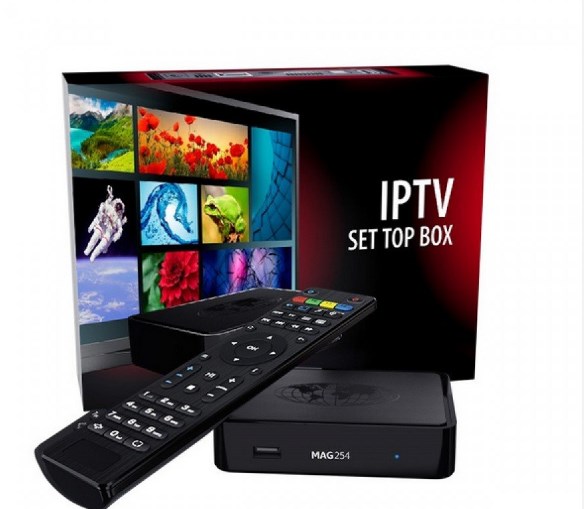Trick Features to Try To Find in an IPTV Service
Trick Features to Try To Find in an IPTV Service
Blog Article
IPTV Explained: Why It's Reinventing the Method We See Television
The appearance of Net Procedure Television (IPTV) represents a pivotal change in exactly how audiences engage with web content. By leveraging web connectivity, IPTV transcends typical broadcasting restrictions, providing customers a dynamic and customizable media experience. This technology not just supplies access to a wealth of programs on-demand however additionally introduces interactive attributes that satisfy modern watching preferences. As we check out the details of IPTV, it ends up being apparent that this advancement is not simply a trend; it presents considerable effects for the future of tv consumption and the landscape of electronic enjoyment.
What Is IPTV?
IPTV, or Internet Procedure Television, is a technique of delivering television material over the internet as opposed to with traditional satellite or cable television styles. This cutting-edge method uses net protocol networks to transfer video information, enabling visitors to access a large range of shows straight via their internet connection. Unlike traditional broadcasting, which depends on radio waves or wire infrastructure, IPTV allows the streaming of material in a much more user-centric and adaptable manner.
One of the key advantages of IPTV is its capability to supply on-demand accessibility to a substantial collection of programs, flicks, and live programs. Clients can enjoy customized seeing experiences, including the choice to stop briefly, rewind, or record material. Additionally, IPTV services commonly integrate interactive functions, such as video on demand, catch-up television, and the ability to access numerous tools at the same time.

Just How IPTV Works

The process begins with material gathering, where numerous television channels and programs are assembled onto a centralized server. From this server, the material is inscribed right into electronic formats suitable for streaming. When a customer chooses a program, the IPTV service retrieves the proper data packets from the server and transmits them to the customer's tool.
IPTV usually operates via set-top boxes or clever Televisions, which decipher the incoming data and make the video for seeing. The innovation uses flexible bitrate streaming to enhance video quality based on the customer's net rate, ensuring a smooth viewing experience. IPTV commonly integrates interactive functions such as pause, rewind, and gain access to to a digital collection, boosting individual engagement. On the whole, IPTV stands for a sophisticated integration of modern technology that transforms conventional television watching into an extra vibrant and customized experience.
Benefits of IPTV
As viewers progressively look for versatility and customization in their home entertainment choices, IPTV supplies a series of benefits that deal with these needs. Among the most significant advantages is the capacity to access content on numerous devices, including smartphones, tablet computers, clever TVs, and computers - Iptv. This multi-device compatibility enables customers to appreciate their favored programs and motion pictures anytime, anywhere, improving their viewing experience
Furthermore, IPTV supplies a substantial library of on-demand web content, enabling clients to select what to watch, when to enjoy it, and how to watch it. This contrasts with traditional broadcasting techniques, where view it audiences are often constricted by fixed routines. Additionally, IPTV solutions regularly use customization features, such as tailored referrals based on watching practices, permitting users to find brand-new content matched to their preferences.
Moreover, IPTV usually consists of advanced functions like cloud DVR capacities, enabling individuals to videotape and keep programs for later viewing. Improved interactivity, such as the capacity to stop, rewind, or fast-forward material, further enhances the checking out experience. Iptv. Collectively, these advantages setting IPTV as an engaging choice to conventional tv, meeting the developing assumptions of today's audiences
Contrast With Typical Television
Typical television and IPTV present unique checking out experiences, each satisfying different audience preferences. Standard television counts on cable, terrestrial, or satellite signals, offering a taken care of timetable for broadcasting. Audiences are often bound to certain time slots to enjoy their favored programs, which can be bothersome in today's busy atmosphere.
In contrast, IPTV supplies content through the internet, permitting users to stream programs and flicks on-demand. This adaptability enables visitors to view material at their comfort, getting rid of the constraints of an established timetable. Additionally, IPTV services usually provide access to a more comprehensive variety of channels and web content, including global programs and specific niche styles that traditional wire plans might not offer.
In addition, the interactivity of IPTV boosts customer interaction, permitting features such as document, rewind, and pause abilities that standard TV does not have. Users can also access these details auxiliary content, consisting of in-depth program overviews and customer rankings, enriching the general viewing experience.
Ultimately, while conventional tv stays a staple for several audiences, IPTV's flexibility and riches of material make it an increasingly preferred alternative, appealing to those seeking more control over their watching routines.
Future of IPTV
The future of IPTV appears promising, driven by innovations in technology and shifting customer preferences. As broadband infrastructure continues to enhance around the world, IPTV services are poised to deliver higher-quality video clip web content with marginal buffering and enhanced customer experiences. This progression is complemented by the proliferation of wise tools, enabling visitors to accessibility IPTV content on mobile phones, tablet computers, and smart Televisions, hence enhancing benefit and flexibility.
Furthermore, the combination of man-made knowledge and artificial intelligence into IPTV platforms is expected to transform content shipment. Tailored referrals based upon viewing habits will enhance user engagement, making it less complicated for clients to uncover pertinent web content. In addition, the unification of increased fact (AR) and digital truth (VIRTUAL REALITY) innovations holds the prospective to produce immersive checking out experiences that standard tv can not match.
The increase of subscription-based designs and ad-supported streaming services indicates a change in exactly how consumers agree to pay for content, better sustaining IPTV's growth. As more customers look for versatility and personalization in their seeing habits, IPTV is most likely to come to be a dominant pressure in the amusement landscape, improving exactly how material is created, distributed, and eaten in the coming years.
Conclusion
In verdict, IPTV represents a transformative improvement in tv usage, supplying audiences unmatched flexibility and control over their seeing experiences. As innovation proceeds to evolve, the capacity for IPTV to more influence media usage patterns and improve the entertainment landscape stays considerable.
The emergence of here Internet Procedure Tv (IPTV) represents an essential change in how audiences engage with material.IPTV, or Net Protocol Television, is a technique of providing television material over the net instead than through conventional satellite or cord styles.Making use of a network of net protocols, IPTV provides television web content through a collection of well-defined processes. Additionally, IPTV services often offer personalization attributes, such as tailored suggestions based on checking out routines, permitting customers to discover new web content suited to their preferences.
Additionally, IPTV services frequently offer access to a wider range of channels and content, including international programming and niche styles that typical wire plans might not use.
Report this page